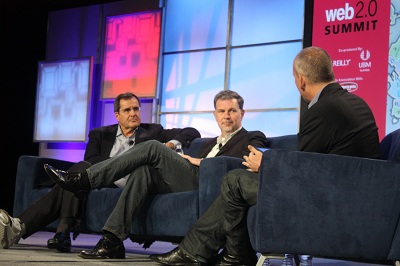Want smarter insights in your inbox? Sign up for our weekly newsletters to get only what matters to enterprise AI, data, and security leaders. Subscribe Now
 Netflix is charging ahead on providing a streaming-only movie service in the United States, according to chief executive Reed Hastings.
Netflix is charging ahead on providing a streaming-only movie service in the United States, according to chief executive Reed Hastings.
Speaking on stage on Wednesday at the Web 2.0 Summit with former News Corp. president Peter Chernin and journalist John Heilemann, Hastings said that the plan to offer subscriptions for movie-streaming only is part of the company’s overall plan to reach as many customers on as many platforms as possible with its movie service.
The streaming-only move will be a counter-move to rival Hulu’s announcement that it would offer a video-streaming service for $7.99 a month. Right now, Netflix offers a movie-streaming only subscription in Canada, but in the U.S. it only offers subscriptions that tie movie-streaming to a DVD-by-mail service.
During the conversation, Chernin said that his lessons from the past media wars are simple. He thinks that Netflix should get as much distribution as it can and offer as wide a selection of content as it can. One problems Netflix faces is that the traditional content owners will try to charge high fees because so many other digital movie distribution companies are bidding up the prices for distribution rights.
Hastings also said that he expects to expand Netflix to a global business. Chernin himself said he is very focused on bringing interesting new digital media services to the big populations of China and Indonesia.
He said that Netflix apps on the iPhone and iPad are doing only moderately well and are far less than the business the company does on the Mac or the TV. That’s because users want to watch their movies, for the most part, on large screens. So the Netflix apps on the Xbox 360, PlayStation 3 and Nintendo Wii are very popular.
“Long-form video is not inherently mobile,” Hastings said. “There are some use cases where the kids can watch in the car or you finish a movie on mobile that you started watching on TV. The big deal is watching on TV where you click and watch the movies there.”
But Chernin said he believes that users in emerging markets are far more likely to watch digital videos on small screens such as smartphones and tablets.
“It will get interesting when you get a $50 to $70 tablet in the hands of 3 billion people,” he said.”Bringing internet video to them is a very big deal. People spend three hours a day on the web. But they spend eight hours a day on TV.”
Hastings said that web-connected TVs are likely to constitute a third of the TV market this fall, two-thirds of the TV market next year, and 100 percent of the TV market in 2012 or so. But he cautioned that it could take 10 years for new features on TVs, such as web connectivity, to spread to most of the population of TV owners.
Hastings said he is bullish on the growth of Google TV and Apple TV in the long-term, but both have problems in the near term with getting access to content and, in Apple’s case, being open enough as a platform.
“Apple has to open it up and include a browser on it,” Hastings said.
But Chernin said that content owners at the TV networks and movie companies are likely very worried that Google and Apple could hurt their primary revenue source of distribution of content on cable TV networks.
“Cable distribution is one of the great business models of all time,” Chernin said. “Fifty to 90 percent of profits at these media companies come from the cable business. They are nervous about being disenfranchised. Piracy is a major concern. But Chernin said he believes that most people will pay a reasonable fee for digital media content if you present it to them in an easy and manageable way.
Beyond Google and Apple, Chernin believes other players such as Microsoft, which operates Xbox Live on the Xbox 360, will also become an important player, as will Samsung and Sony.
“TV is a half trillion-dollar business,” Chernin said. “There are huge amounts of money at stake.”
During the next three to five years, Hastings said, Netflix’s plan is to “get everywhere,” including Europe, where users have the propensity to pay for movies.

